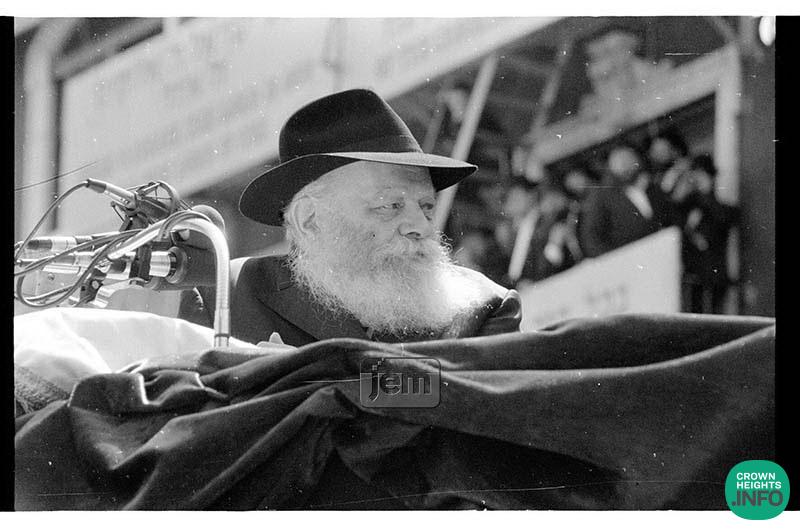
Weekly Dvar Torah: 30 Days of Reflection on 30 Years Since Gimmel Tammuz – The Rebbe’s Plan
As Gimmel Tammuz approaches, marking 30 years since the Rebbe’s passing, the weight of this solemn day presses heavily upon me. Every year, I struggle deeply with the realization that another year has passed without the ultimate redemption, and we still cannot see or hear the Rebbe.
I vividly remember that fateful day. It was a Sunday morning, and I wandered aimlessly, dressed in my Shabbos best, filled with the hopeful anticipation that at any moment Moshiach would arrive. The recent events felt like a waking nightmare, yet I clung to the belief that redemption was imminent: “הגיע זמן גאולתכם = the time of your redemption has arrived.” It could not be any different!
As I drifted along Eastern Parkway, lost in my thoughts, I unexpectedly saw my aunt, Rebbetzin Golda Schwei, A”H, sitting on a bench. We exchanged a silent, dazed glance. She murmured softly, “אבער מען טאר דאך ניט וויינען = but we are prohibited from crying!” Her words conveyed volumes; in that moment, we understood each other without further explanation.
The following day, Daled Tammuz, I spotted from afar my mentor, Reb Mendel Futerfas, who had traveled from England. Frail and leaning on a grandchild for support, he epitomized wisdom and resilience. Approaching him, hoping for solace or perhaps a shared moment of grief, I stood before him with tear-filled eyes and a heavy heart. Reb Mendel returned my gaze, his expression wordlessly echoing the pain we all felt. After a long silence, he finally spoke, his voice breaking through like a torrent: “אה, מען וועט נאך האבן אויף וואס צו פארברענגען = oh, we will still have what to Farbreng about!”
During the early 1960s, when the Iron Curtain sealed off many Jews, including close family members, in the USSR, communication was a crime punishable by severe consequences. Yet, the Rebbe consistently remembered them in his speeches, raising a toast for their freedom with unwavering confidence. Against all odds, decades later, the Iron Curtain fell—a testament to the Rebbe’s prophetic faith.
My father often reflected that believing in Moshiach’s imminent arrival today is easier than believing the Iron Curtain would one day crumble. When the Rebbe assured us of redemption, we must hold on to that certainty.
Today, 30 years after Gimmel Tammuz 1994, I ache with longing. I was born and raised alongside the Rebbe, and nothing compares to the life I knew with him. I think of the Hayom Yom of Gimmel Tammuz, where the Rebbe teaches that a sigh from a broken-hearted Jew is a profound form of Teshuva.
I ponder the Rebbe’s final Maamar, V’Ata Tetzaveh, where he delves into the concept of being Kosis, broken-heartedness over our continued exile. Despite our material and spiritual prosperity, the lingering pain of Golus persists—a testament to our soul’s yearning for the Divine.
How do I navigate this day that breaks me? I draw strength from my father’s unwavering belief in Moshiach’s imminent arrival, my aunt’s reminder not to despair, and Reb Mendel’s affirmation that there is reason to celebrate even amidst sorrow. They offer a Chassidic perspective: What good comes from despair? What is life without faith?
Thirty years have passed, affirming their wisdom. The Rebbe’s presence resonates more profoundly than ever, guiding and strengthening us. Despite the challenges, Lubavitch thrives, a testament to his enduring influence.
Yet, amid all this growth and strength, nothing compares to having the Rebbe physically present with us. He embodies the essence of perfection and the divine in our world. He alerted us to the imminent arrival of Moshiach; it’s high time for his vision to come to fruition!
I cry out in anguish: Ad Mossai? How much longer?
Only 5 days prior to Gimmel Tammuz, we celebrate the 28th of Sivan, marking the 83rd anniversary since the Rebbe set foot on the shores of the United States of America. This milestone symbolizes his visionary effort to transform America into a center of Jewish outreach and Moshiach awareness. Perhaps the timing of these dates suggests that the Rebbe laid the groundwork for Moshiach’s imminent arrival long before the sorrow of Gimmel Tammuz. It’s akin to preparing medicine before the onset of a pandemic—we are in capable hands. The Rebbe’s teachings continue to guide us, and despite the pain, we are steadily advancing towards redemption.
Have a Longing Inspiration of a Shabbos,
Gut Shabbos
Rabbi Yosef Katzman














